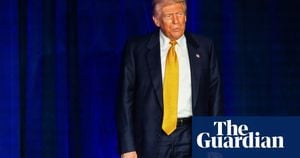North Korea's recent military involvement alongside Russia has ignited serious concerns on international fronts, as the specter of North Korean troops deploying to Ukraine poses significant risks of escalation. With over 10,000 North Korean soldiers reportedly stationed mainly around the Kursk region, diplomats and analysts observe potentially grave consequences for global security. This pact between North Korea and Russia, underscored by mutual defense treaties, suggests not only military collaboration but also indicates the intertwining of conflicts across continents.
The relationship between North Korea, long viewed as one of the world's most isolated nations, and Russia has evolved significantly. At the heart of this partnership is the Treaty on Comprehensive Strategic Partnership signed earlier this year, which asserts mutual assistance should either nation face invasion. Observers note this treaty could prompt North Korea to engage more actively on the battlefield, particularly after ratifying it through legislative bodies. Analysts like Choi Yonghwan from the Institute for National Security Strategy have suggested Ukraine's military actions may have influenced North Korean involvement due to increased perceptions of threat following these developments.
U.S. intelligence officials confirmed reports of North Korean troops potentially engaging directly with Ukrainian forces, marking the first entry of soldiers from Pyongyang since the war escalated. This escalation raises tough questions for Ukraine and its allies, prompting fears of widening involvement from both North Korea and Russia amid already heightened tensions surrounding the Ukraine conflict.
German Chancellor Olaf Scholz has made clear the seriousness of this situation, directly labeling North Korean troop involvement as "a grave escalation" during his calls with Russian President Vladimir Putin. Scholz urged for de-escalation and expressed his condemnation of Russia's military decisions. His sentiments echo the growing apprehension among Western nations who view the treaty as fostering increased instability.
During recent press conferences involving U.S. President Joe Biden, South Korean President Yoon Suk-yeol, and Japanese Prime Minister Shigeru Ishiba, leaders voiced strong opposition to the burgeoning military ties between North Korea and Russia. The trilateral discussions, held during the APEC summit, underscored the united front against perceived threats from North Korea, underlining the urgency for enhanced cooperative defenses amid shifting political landscapes. Biden's remarks focused on the importance of containing North Korea's alliance with Russia, deeming it dangerous and destabilizing.
President Yoon reinforced this call for solidarity, referencing North Korea's troop movements and emphasizing the need for enhanced military alliances with the United States and Japan. The push for shared military responsibilities has become increasingly pertinent as tensions persist, illuminating the precarious nature of security dynamics within East Asia.
Adding another layer of complexity is the existential fear and anxiety faced by families of the North Korean soldiers currently deployed. Defectors, like Kim Jeong-ah—a former military officer and now an activist—express deep concern for the mothers of these troops, highlighting the emotional toll the regime’s military secrecy takes on families who remain uninformed about their loved ones’ safety and whereabouts. Such anxiety is prevalent among North Korean communities, exacerbated by the regime's tight grip on information, which prevents news about troop deployments from being disclosed to civilians. This leads to generational hostility within families, particularly if soldiers face casualties or choose to defect instead of serving under foreign powers.
Military experts indicate North Korean forces joining Russia's campaign may lack adequate training and resources, raising questions about their combat effectiveness. Reports suggest these soldiers, often described as "cannon fodder," may be ill-prepared for the rigors of conflict, potentially making them vulnerable on the battlefield. This dynamic could result not only in high casualties among North Korean troops but also complicates overall military strategy for both Russian and Ukrainian forces.
Historically, the Korean Peninsula has served as the front line for various geopolitical conflicts, often embroiled between larger power struggles involving the United States and China. The revival of Cold War-era tensions surrounding North Korea's military alliances could signify the beginning of colder relations among nations not accustomed to direct military confrontations. Kim Jong Un’s reiteration of the Korean Peninsula as pivotal to this new Cold War reflects the regime's recent pivot to strengthening ties with Moscow and Beijing, often seen as western adversaries.
This new era marked by North Korea's commitment to Russia raises vexing inquiries about how international powers will navigate the interwoven challenges of diplomacy, military strategy, and humanitarian concerns. The growing presence of North Korean troops within Russia's borders not only emphasizes the potential for escalation within the Ukraine conflict but also forces prior traditional alliances to re-evaluate their positions amid these ever-shifting alliances.
It remains uncertain how the United States and its allies will continue to respond to these developments, especially as political tides shift with the expected return of Donald Trump to the presidency, who has voiced intentions to adopt more isolationist policies which could potentially impact military aid to Ukraine. Tensions mount as battle lines get drawn, prompting urgent discussions about how best to contain what could easily morph from regional disputes to monumental global conflicts.
Each day brings fresh worries for policymakers striving to maintain stability as they confront the specter of North Korean forces participating actively alongside Russia. Their fate, like those caught between greater powers, often lies perilously at the seams of geopolitical maneuvering and strategic ambition, illuminating the necessity of dialogue and cautious diplomacy to avert widespread disaster.



